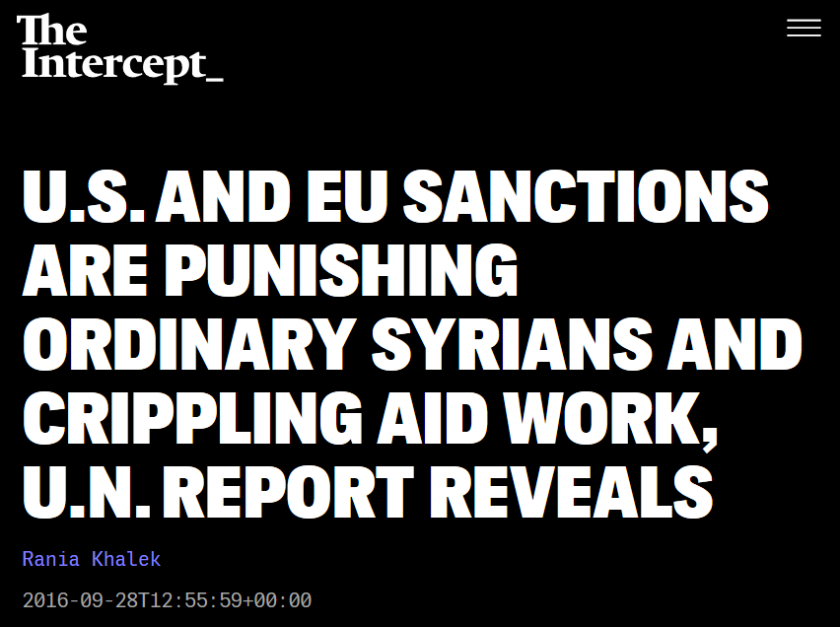
The online publication launched by eBay founder Pierre Omidyar recently published what it billed as a major scoop: “Internal United Nations assessments obtained by The Intercept reveal that U.S. and European sanctions are punishing ordinary Syrians and crippling aid work during the largest humanitarian emergency since World War II.” These sanctions were likened by author Rania Khalek to the siege the U.S. imposed on Iraq, which a U.N. report in 1999 said had doubled child mortality in the country, leading to “the death of 500,000 children.”
Khalek’s piece was well received by others who prefer to omit the words “barrel bombs,” “cruise missiles” and “starvation sieges” from their coverage of Syria’s humanitarian crisis, which has seen roughly 500,000 people killed since 2011, the majority, according to the U.N., killed at the hands of the Syrian regime and its allies. Russia’s RT and the state-run Syrian Arab News Agency both amplified the story’s conflation of targeted sanctions against Bashar al-Assad and his top officials with an all-encompassing economic embargo. “US and EU economic sanctions on Syria are causing huge suffering among ordinary Syrians and preventing the delivery of humanitarian aid, according to a leaked UN internal report,” wrote The Independent’s Patrick Cockburn.
The problem for The Intercept and those who reported on its claim is the oft-unwelcome truth among those committed to blaming someone other than Bashar al-Assad for the bulk of the suffering in Syria: The only hint of truth in Khalek’s lede is that Syrians are suffering through the worst war the world has seen since Adolf Hitler’s self-inflicted demise in a bunker underneath Berlin.
To start: What is billed as “Internal United Nations assessments” is but one report that wasn’t internal and, explicitly, does not reflect the view of the United Nations. The Intercept has since acknowledged this in one of the corrections issued at the end of Khalek’s piece: “The report referenced was prepared for the U.N. and does not reflect the U.N.’s official position.”

The latter clause is perhaps intentionally suggestive: “official,” if you know what I mean. What is not explicitly stated is that the report that was “obtained” was a report available freely online at least four months earlier, authored not by a U.N. official or agency but by an official, Justine Walker, at the British Bankers’ Association, an organization institutionally inclined to favor Western trade with literally whomever, capital and those who possess it not troubled by grave violations of human rights.
 That this is not a “U.N. report,” as The Intercept states in its headline, or a “United Nations” assessment, as Khalek states in her lede, is buried all the way back on page three of this banker’s assessment: “The views expressed are entirely those of the author and should not be considered to constitute any official statement.”
That this is not a “U.N. report,” as The Intercept states in its headline, or a “United Nations” assessment, as Khalek states in her lede, is buried all the way back on page three of this banker’s assessment: “The views expressed are entirely those of the author and should not be considered to constitute any official statement.”

Attributing one view solicited by an organization to the organization as a whole is like suggesting an OpEd from the foreign minister of Iran reflects the institutional take of The New York Times, which after all commissioned it. And yet: The headline, and the lede, persist, admitting a fatal mistake as hard for some as admitting who is chiefly to blame for punishing ordinary Syrians.
Shameful to see leftists supporting editorial interventionism. You are just trying to silence anti-imperialist voices like Rania Khalek’s with your insistence on factual accuracy which, by the way, is a thoroughly neoliberal concept and totally contrary to Bashar al-Assad Thought.
One more point – and the most crucial one unless my memory is off: isn’t the report TO the UN the one from aid agencies saying “we WANT to do our jobs, we WANT to work with the UN, but we CAN’T as long as they take orders from Assad?
Full marks for tracking down the origin of this report – I had suspected something like this this but not been able to locate it. I wouldn’t be dismissive of the report simply based on its authorship: involving someone with knowledge of banking is one of its strong points, since a large part of its criticisms are directed at risk-averse banks who amplify considerably the impact of the sanctions regime. Its critique of the bureaucratic complexity of the US sanctions regime also rings true. Aid projects destined for opposition areas also suffer heavily from these problems – the three examples it gives of blocked medical supplies almost certainly relate to projects in opposition communities.
But it is vastly over-hyped by Khalek – the report simply doesn’t present the kind of cataclysmic picture she suggests: for that she has to rely on a second anonymous email, whose status is totally unclear.
The report does however tend to adopt the usual ngo “diplomatic” unwillingness to offend the Syrian government. Thus it notes ” Over half the country’s public hospitals have been damaged or destroyed. British doctors working in Aleppo have indicated that over 80% of those requiring urgent medical treatment die as a result of their injuries, or lack of basic care, medicine and equipment.” But fails to make clear that this is a result of the Syrian regimes targetting of health facilities – not the sanctions regime (the fact that Dr David Nott is their source here makes that fact indisputable.)